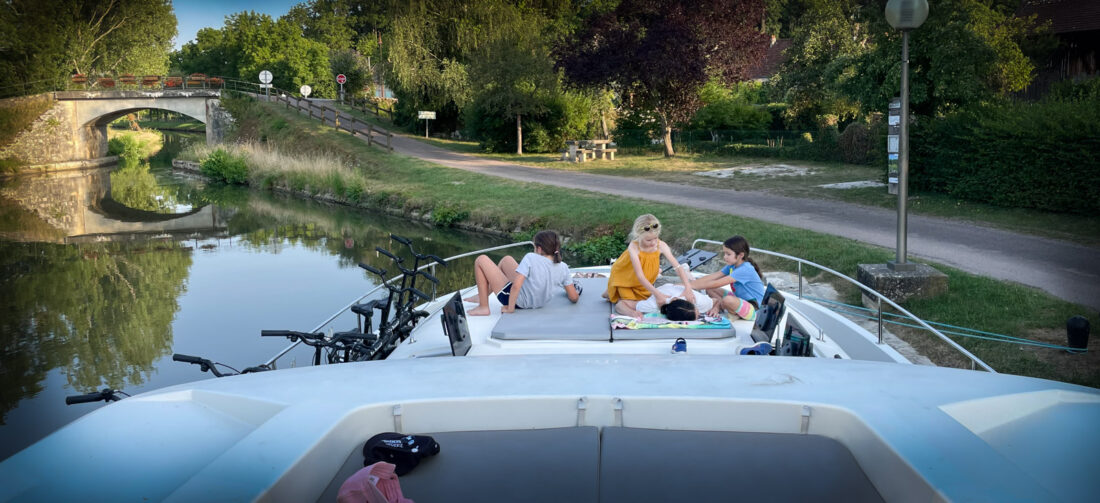“Vacationing” on a barge in France
Mistakes were made–our first was assuming that there would be a grocery store open in the town where we set sail, on a Sunday, late in the afternoon. We arrived at the boat launch on the Canal du Nivernais outside the town of Cuzy full of naive optimism, assuming we’d sail to the next town, find a great restaurant, a tidily stocked market, and a boulangerie for the next morning.
We met our boat, and it seemed … surprisingly long, 48 feet. More surprising still was the fact that the company seemed willing to just turn it over to us. After a quick training from a cheery Dutch guy, we took to the river, learning on the job what it took to pilot it along the narrow canal, under even narrower bridges, and into narrower still locks. Happily, my brother-in-law Nathan ended up being a gifted beginner–turns out his college stint as the president of the tractor club at UC Davis gave him a visceral understanding of massive-but-slow vehicles.
Out on the canal, we were confronted with some realities that didn’t quite line up with the vision of the adventure. First, the stretch of the canal we were on certainly had towns, but nearly all were mostly abandoned, home to maybe a half dozen families and no shops. This is where I mention that we boarded the boat as four adults, four children, one liter of water, one packet of cookies, and one record-breaking heatwave. As we realized that food and water was more than a short sail away, we adjusted our plan. We would:
- Pretend the engines were too loud to hear the children when they said they were thirsty.
- Go full throttle (3 miles per hour) down the canal, learning how to navigate the locks from the lock keepers as we went.
- Try to get as close as possible to the larger town of Clamecy, where there was a rumored single restaurant and grocery store open on Sundays.
As we bumped gingerly into the first lock six miles from Clamecy, the lock keeper shouted instructions, sending the adults scurrying up and down the ladder, throwing ropes, steadying the boat as the water poured out of the lock and we plunged downward. By the time the doors of the lock swung open, we were sweaty and a little stunned–what were we doing here again? Why had anyone thought it was a good idea to entrust our group of total beginners with this massive boat? With each lock, we grew grimier but more confident. By the time the locks closed at 7 o’clock, we smelled like we belonged on the river and had sailed a full two miles. Which math and reality insisted meant we still had four miles to go to get to Clamecy.
The drinking water had run out a mile back, and thirst was all we could talk about, so we moored on a grassy bank, rolled the little rental bikes off the boat, and pedaled along the towpath in the waning light. On the one hand, it was achingly beautiful: the still water, the dense forest on either side, the hum of the cicadas as the day cooled and the breeze stirred. On the other, convincing an 8-year-old to pedal through the thirst turns out to be a hard sell.
But we got to town, found food and drink, and returned back in the dark, following the chalk-white of the path along the canal to find our way back, then fell asleep stargazing on the padded loungers on the roof of the boat.
This cadence–near disaster, physical exhaustion, crisis deflection, and moments of grace–characterized the following days. We swam in the river that parallels the canal (pro tip: don’t swim in canals in France; it’s still legal to flush toilets directly into their waters), we had big dinners and gathered around the outdoor table on the boat. But also, we sustained injuries that may have required stitches (we settled for tight bandaids), pedaled one kid into near-heat exhaustion, and wilted and sweated through the intense heat. And the thing I had anticipated most, the river towns, they were nearly all deserted. Not just shut for summer but simply and sadly … empty.
If I were to do it again–and I’m not sure I would–I would seek a more beaten path, because now I understand that with tourism comes towns that survive, towns with important things like restaurants and places to buy water (even on a Sunday). I’d also choose a smaller boat and arrive fully stocked up on food and water. I’d do more fitness training in advance to prepare for the physical demands of boat life. Finally, I’d skip the hot days of July and opt for a cooler sail on one of the bookends of summer.
As we were driving away after returning the boat, my 10-year-old son Augie looked out the window and said to no one in particular, “Adventures are always an adventure, but it doesn’t mean they always go well.” Word, kid.






